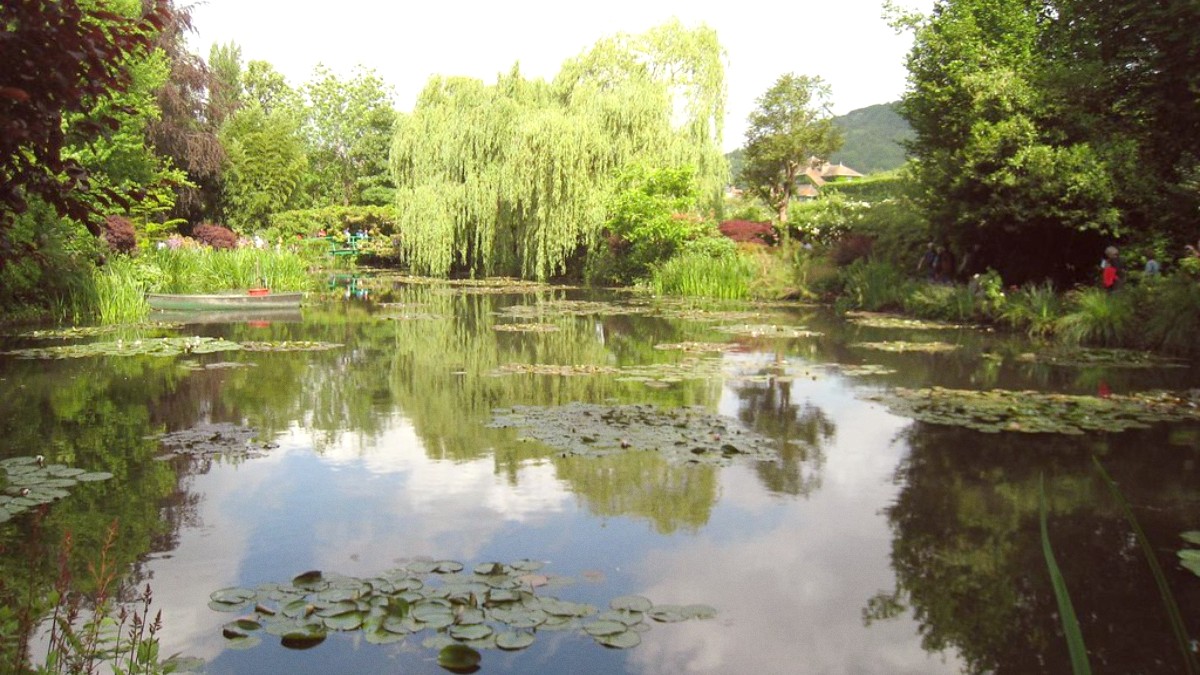
France
Temperatures typically range from 10-18°C (50-64°F) in Spring (April-May). This period sees moderate precipitation and fresh air. Early spring might bring cool mornings, while late spring warms up. Summer (June-August) is the warmest period, with temperatures averaging 18-25°C (64-77°F), though sometimes higher. Precipitation is lower, and humidity levels are pleasant.
Autumn (September-October) brings cooler temperatures, ranging from 8-15°C (46-59°F). Precipitation rises, and the foliage changes colors. Winter (November-March) is the coldest period, with average temperatures between 2-8°C (36-46°F). Precipitation is higher, often as rain, and occasional light snow occurs. Monet's gardens close during these months.
All facilities, shops, and restaurants are open during High Season (May-July). Weather is generally ideal for outdoor activities and comfortable exploration. Expect significant crowds and potentially higher prices. Shoulder Season (April, August, September, October) sees fewer crowds and pleasant weather. Prices for some services might be slightly lower. Low Season (November-March) has very few tourists. Accommodation prices are at their lowest. Claude Monet's House and Gardens are closed. Weather is cold and often wet. Dining and activity options are very limited.
Specific blooms bring unique beauty in Shoulder Season: tulips in April, dahlias and asters in September and October. August still has good weather, though some French holidaymakers may be present. Rain is more frequent in October.
Peak tourism, ideal weather.
Full operation of attractions, best weather for gardens.
Crowds, longer queues, higher prices. Book early.
Fewer crowds, variable weather.
Relaxed experience, pleasant weather (especially April, Sep).
August still busy, October cooler with more rain.
Minimal tourism, cold weather.
Quiet village, lowest accommodation prices (if available).
Monet's gardens closed, cold and wet weather.
Late April, May, June, and early July show peak floral displays. The Water Garden reaches its prime with water lilies in late June and July. Aim for early morning (right at opening time) or late afternoon (two hours before closing) to avoid the largest crowds. These times also present softer light for photography.
Spring and early autumn temperatures suit exploring the Vernon-Giverny "voie verte" (greenway). The path is scenic and less crowded in the shoulder seasons.
Best for floral displays in Monet's gardens.
Fewer crowds and better light for garden photography.
Comfortable temperatures for cycling or walking the greenway.
Any time for art immersion at the Musée des Impressionnismes Giverny.
Consider cooler weather and reduced attraction hours.
France is a member of the Schengen Area, meaning entry rules are harmonized across 27 European countries.
Many citizens (e.g., US, Canada, Australia, UK) do not need a Schengen visa for stays up to 90 days within any 180-day period. This period covers tourism, business, and short visits. Citizens of other countries typically need a Schengen short-stay visa. Applications occur through the French embassy or consulate in the applicant's country of residence.
Always carry the following documents. Have them readily available for inspection by border officers, who might inquire about your visit, stay duration, and proof of funds or accommodation.
The official currency of France is the Euro (€). ATMs are widely available in Vernon, the nearest town with a train station, and in larger cities like Paris. Credit and debit cards are widely accepted in Giverny's shops, restaurants, and at attractions. Currency exchange services are limited in Giverny itself.
Tipping is not obligatory in France. A service charge ("service compris") typically exists in restaurant and cafe bills. However, rounding up the bill or leaving a small additional tip for good service is customary.
Giverny is a very safe destination, but taking precautions makes for a smooth trip.
No specific vaccinations are for entry to France from most countries. Routine vaccinations, like Measles-Mumps-Rubella (MMR), Diphtheria-Tetanus-Polio (DTP), and influenza, are recommended. Consult with a healthcare provider for personalized advice before travel.
Common issues are minor, like traveler's diarrhea (rare in France but possible), colds, or minor cuts. Practice good hand hygiene, especially before meals. Drink plenty of water to stay hydrated, specifically during warmer months.
Tap water is safe to drink throughout France, including Giverny. Food hygiene standards are very high in restaurants and food establishments. Eat with confidence.
Tap water is safe.
High food hygiene standards.
Giverny is a very safe village with extremely low crime rates. Violent crime is rare. The main concern for tourists arriving via Paris might be pickpocketing in crowded areas like train stations (e.g., Paris Saint-Lazare) or major attractions in Paris.
Very safe village, low crime rates.
Caution with belongings in crowded Paris areas.
Natural disaster risks are minimal in the Giverny area. The region is not prone to earthquakes, hurricanes, or extreme weather events like prolonged heatwaves or blizzards. Occasional localized flooding occurs during very heavy rains, but this is rare and temporary. Always check local weather forecasts.
Minimal disaster risks.
No major earthquakes or hurricanes.
| Coverage Category | Details | Recommended Providers |
|---|---|---|
| Medical Emergencies | Hospitalization and medical evacuation. | World Nomads, SafetyWing |
| Trip Interruption | Cancellation or interruption due to unforeseen events. | Insubuy |
| Baggage & Personal Items | Lost, damaged, or stolen luggage and personal belongings. | Pacsafe (for security products) |